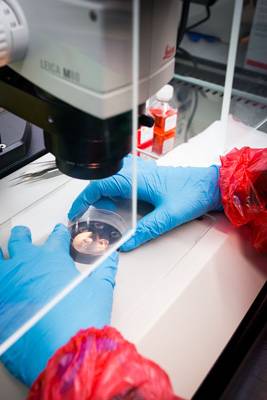
We conduct biomedical research using a wide variety of non-animal methods including medical imaging, computer modelling, human volunteer studies, tissue culture, genetic and statistical studies. However, despite advances in non-animal methods it is still essential to use animals where no viable alternatives exist. This enables further much-needed advances in medical knowledge and treatments.
When we need to use animals
Animals are only used when no other methods can address the research questions being posed. Where alternative methods are available, researchers will always use these before considering animal models. The high standards of welfare at UCL make it expensive to use animals, so there is no incentive for researchers to do so unless absolutely essential.
Scientists are continuing to develop models to replace animal research, but there are still many questions that such models cannot answer. For example, early-stage cancer treatments must still be tested in mice before they can progress. This helps researchers to see which treatments are effective against certain cancer types, and can lead to unexpected discoveries. For example, UCL research in mice found that a class of drug used to treat leukaemia also boosts immune responses against many different cancers.
Benefits of animal research
Animal research has played a vital role in the development of virtually every medicine that we take for granted today. However, despite decades of dedicated research, many widespread and debilitating conditions are still untreatable. Medical research is a slow process with no easy answers, but animal research helps to take us incrementally closer to cures for cancer, dementia, stroke and countless other conditions.
Not every animal study will lead directly to a treatment. Researchers need to work out the specific mechanisms by which a disease develops before they can explore treatments to target it. The relevance of research to human diseases may not always be immediately obvious from a scientific paper but that does not mean there is none. A clear need for animal research is required before it can be approved, as strictly regulated by UCL review boards and the Home Office.
Some research will show that a line of treatment is not worth pursuing. Although this can be disappointing, such studies are incredibly valuable. We need to know what methods do not work so that we can develop new ones, and we will never know unless we try.
 Close
Close

